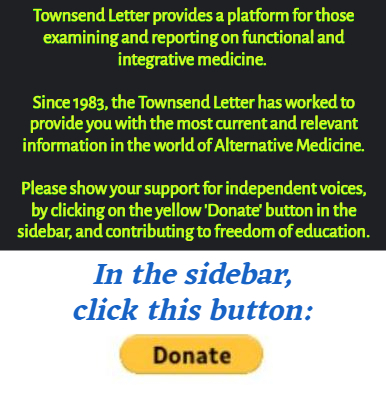A friend was experiencing daily diarrhea, no other symptoms. It was to the point that she worried about being too far from a bathroom. The diarrhea disappeared when she stopped drinking diet sodas and chewing gum that contain aspartame and sucralose. Interestingly, another friend reported having the same experience. It makes me wonder how many people using drugs to control diarrhea simply need to avoid artificial sweeteners.
It also brings to mind Dr. Alan Gaby’s January 2019 editorial, “It Doesn’t Always Have to Be Complicated.” He gives several examples from his clinical practice in which patients got better by using “simple, low-cost, low-tech, low-risk interventions.”
After having only a partial response to proton pump inhibitors and other medications, a young man with a long history of heartburn consulted Dr. Gaby. By asking the right questions, Dr. Gaby learned that the fellow was in the habit of eating very fast. “He was advised to chew each mouthful thoroughly, and this change alone resulted in an 80% improvement in his symptoms,” Gaby writes. “Subsequently, he removed most of the ‘junk food’ from his diet and became symptom-free.”
In questioning another patient, a woman suffering with chronic fatigue, Dr. Gaby learned that her fatigue improved when she didn’t eat! “That observation, as well as some aspects of her past medical history, suggested the possibility of hidden food allergy,” he writes. “Her fatigue disappeared on an elimination diet and recurred when she reintroduced soy, which had been a regular part of her diet. She remained symptom-free as long as she avoided soy-containing foods.”
Another female patient reported persistent anxiety that began about a month after commencing a thiazide diuretic for hypertension. Anti-anxiety drugs had not helped her. “Thiazide diuretics are known to deplete magnesium, and magnesium deficiency is, in my experience, a common cause of anxiety,” Gaby explains. The woman noticed an improvement within a few days of taking 400 mg per day of supplemental magnesium.
Dr. Gaby’s young daughter had minor musculoskeletal problems, including uncomfortable clicking and popping on both sides of her jaw, which is characteristic of temporomandibular joint (TMJ) syndrome. Treatment for TMJ includes anti-inflammatory medications, analgesics, muscle relaxants, mouth guards, physical therapy, and even surgery in severe cases. In his daughter’s case, a chiropractor used an ‘activator’ to deliver a gentle force over each of the TMJ discs, which brought “immediate and complete resolution of the symptoms.” The chiropractor reported that about 80% of the people he had treated for TMJ (mostly acute cases) had very good results.
“These case reports are presented to remind us that the practice of medicine does not always have to be complicated, and that simple and straightforward solutions to problems are often available,” Gaby says.

Jule Klotter
REFERENCE:
Gaby AR. It Doesn’t Always Have to Be Complicated. Townsend Letter. January 2019;89-90.







